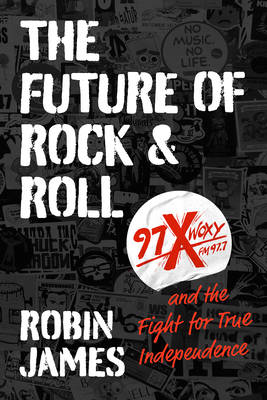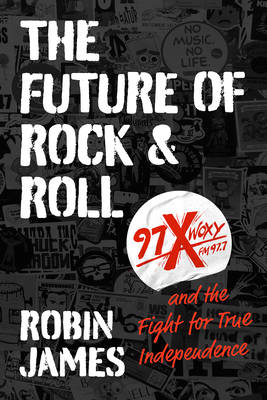
Je cadeautjes zeker op tijd in huis hebben voor de feestdagen? Kom langs in onze winkels en vind het perfecte geschenk!
- Afhalen na 1 uur in een winkel met voorraad
- Gratis thuislevering in België vanaf € 30
- Ruim aanbod met 7 miljoen producten
Je cadeautjes zeker op tijd in huis hebben voor de feestdagen? Kom langs in onze winkels en vind het perfecte geschenk!
- Afhalen na 1 uur in een winkel met voorraad
- Gratis thuislevering in België vanaf € 30
- Ruim aanbod met 7 miljoen producten
Zoeken
The Future of Rock and Roll
97x Woxy and the Fight for True Independence
Robin James
Hardcover | Engels
€ 167,95
+ 335 punten
Uitvoering
Omschrijving
In 1983, an Ohio radio station called WOXY launched a sonic disruption to both corporate rock and to its conservative home region, programming an omnivorous range of genres and artists while being staunchly committed to local independent art and media. In the 1990s, as alternative rock went mainstream and radio grew increasingly homogeneous, WOXY gained international renown as one of Rolling Stone's "Last Great Independent Radio" stations. The station projected a philosophy that prioritized such independence--the idea that truly progressive, transgressive, futuristic disruptions of the status quo were possible only when practiced with and for other people.
In The Future of Rock and Roll, philosopher Robin James uses WOXY's story to argue against a corporate vision of independence--in which everyone fends for themselves--and in favor of an alternative way of thinking and relating to one another that disrupts norms but is nevertheless supported by communities. Against the standard retelling of the history of "modern rock," James looks to the local scenes that made true independence possible by freeing individual artists from the whims of the boardroom. This philosophy of community-rooted independence offers both a counternarrative to the orthodox history of indie rock and an alternative worldview to that of the current corporate mainstream.
In The Future of Rock and Roll, philosopher Robin James uses WOXY's story to argue against a corporate vision of independence--in which everyone fends for themselves--and in favor of an alternative way of thinking and relating to one another that disrupts norms but is nevertheless supported by communities. Against the standard retelling of the history of "modern rock," James looks to the local scenes that made true independence possible by freeing individual artists from the whims of the boardroom. This philosophy of community-rooted independence offers both a counternarrative to the orthodox history of indie rock and an alternative worldview to that of the current corporate mainstream.
Specificaties
Betrokkenen
- Auteur(s):
- Uitgeverij:
Inhoud
- Aantal bladzijden:
- 190
- Taal:
- Engels
Eigenschappen
- Productcode (EAN):
- 9781469673448
- Verschijningsdatum:
- 2/05/2023
- Uitvoering:
- Hardcover
- Formaat:
- Genaaid
- Afmetingen:
- 156 mm x 234 mm
- Gewicht:
- 476 g

Alleen bij Standaard Boekhandel
+ 335 punten op je klantenkaart van Standaard Boekhandel
Beoordelingen
We publiceren alleen reviews die voldoen aan de voorwaarden voor reviews. Bekijk onze voorwaarden voor reviews.









